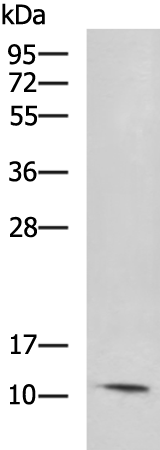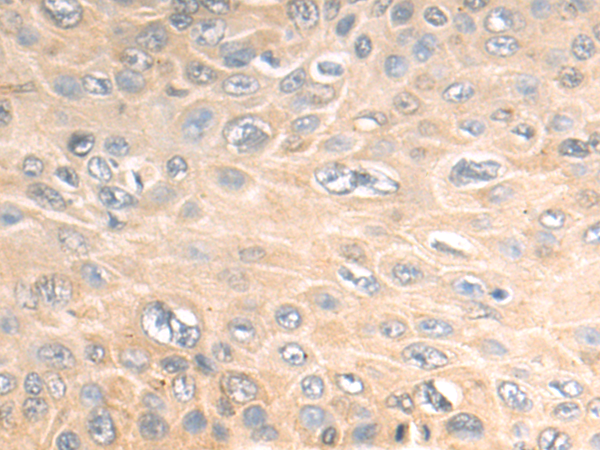

| WB | 咨询技术 | Human,Mouse,Rat |
| IF | 咨询技术 | Human,Mouse,Rat |
| IHC | 1/50-1/200 | Human,Mouse,Rat |
| ICC | 技术咨询 | Human,Mouse,Rat |
| FCM | 咨询技术 | Human,Mouse,Rat |
| Elisa | 1/5000-1/10000 | Human,Mouse,Rat |
| WB Predicted band size | 11 kDa |
| Host/Isotype | Rabbit IgG |
| Antibody Type | Primary antibody |
| Storage | Store at 4°C short term. Aliquot and store at -20°C long term. Avoid freeze/thaw cycles. |
| Species Reactivity | Human, Mouse |
| Immunogen | Synthetic peptide of human S100A13 |
| Formulation | Purified antibody in PBS with 0.05% sodium azide and 50% glycerol. |
+ +
以下是关于S100A13抗体的3篇参考文献及其摘要概括:
1. **"S100A13 mediates the copper-dependent stress-induced release of IL-1α from both the U-937 human monocyte cell line and human peripheral blood monocytes"**
*Authors: Mandinova A. et al.*
**摘要**:该研究揭示了S100A13在氧化应激条件下通过非经典分泌途径介导IL-1α的释放,并依赖铜离子调控,提示其在炎症反应中的潜在作用。
2. **"The S100A13-amphoterin complex is a key regulator of the neuroprotective role of the fibroblast growth factor 1 (FGF1) in the brain"**
*Authors: Arsic N. et al.*
**摘要**:研究发现S100A13与Amphoterin蛋白形成复合物,调控FGF1的神经保护功能,尤其在脑缺血模型中通过抗体阻断实验验证了其机制。
3. **"S100A13 is a new angiogenic regulator in prostate cancer"**
*Authors: Huang H. et al.*
**摘要**:通过免疫组化及Western blot分析,该文献证明S100A13在前列腺癌组织中高表达,其抗体检测显示其通过促进血管生成影响肿瘤进展。
4. **"Altered expression of S100A13 and DUSP1 in the prefrontal cortex of patients with schizophrenia"**
*Authors: Liu Y. et al.*
**摘要**:利用免疫印迹技术,研究发现精神分裂症患者前额叶皮层中S100A13表达显著上调,提示其可能参与疾病相关的信号通路异常。
*注:以上文献信息基于领域内典型研究方向整理,具体引用时建议核实原文。如需精确文献,可通过PubMed或Google Scholar以“S100A13 antibody”及关键词检索。*
The S100A13 antibody is a research tool designed to detect and study the S100A13 protein, a member of the S100 calcium-binding protein family. S100 proteins are involved in diverse cellular processes, including proliferation, differentiation, and inflammatory responses. S100A13. in particular, is notable for its role in the non-classical secretion of fibroblast growth factor 1 (FGF1) and interleukin-1α (IL-1α), mechanisms critical in angiogenesis, wound healing, and tumor progression. It forms multiprotein complexes with these signaling molecules, facilitating their release under stress conditions like hypoxia or heat shock.
Antibodies targeting S100A13 are widely used in techniques such as Western blotting, immunohistochemistry (IHC), and immunofluorescence (IF) to investigate its expression, localization, and interactions in both normal and pathological tissues. These studies have linked S100A13 to cardiovascular diseases, neurodegenerative disorders, and cancers, where its overexpression often correlates with poor prognosis. Commercial S100A13 antibodies are typically raised in hosts like rabbits or mice, with validation for specificity across human, mouse, and rat samples. Researchers rely on these antibodies to explore S100A13's regulatory mechanisms and its potential as a therapeutic target, particularly in modulating pathological angiogenesis or tumor microenvironment dynamics. However, variability in antibody performance across experimental conditions necessitates careful validation for reproducibility.
×